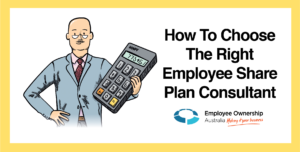 One of the questions we are most often asked at the EOA is “how do I choose the right ESOP consultant to set up my employee ownership plan?”.
One of the questions we are most often asked at the EOA is “how do I choose the right ESOP consultant to set up my employee ownership plan?”.
There is no shortage of people claiming to have expertise in this field. From time to time, we hear from people that their advisors told them they had a good understanding of employee share plans law and processes, only to find out later that they were not as expert as they claimed.
Choosing well qualified, experienced people is essential – the penalties for plan disqualification, tax and interest charges for employees, poor plan administration, improper evaluations, inadequate repurchase liability analyses, and other problems can be severe for owners and employees alike.
Perhaps more importantly they can also make a plan that was conceived as an incentive or a real ownership tool for employees into something that is considered a de-motivator. If this happens, often it is a hard road to turn around your employees’ perceptions for any future plans.
How to choose your ESOP consultant
While there is no formula for choosing your advisers, there are some key questions to ask:
1. Can the consultant group cover everything, legal review and documentation, taxation advice, advice around the ideal plan design, effective communications and administration. Choose a firm that can offer all of this through their own services or those of preferred suppliers or is able to manage the selection of a preferred supplier. It is no good getting the plan right in the legal area if you have no idea how the tax works.
2. If it is a private or unlisted company ESOP, you will also need a valuation specialist, an independent trustee, a financial adviser. Do they have experience of this?
3. To understand whether your consultant has a real depth of experience with ESOPs, ask them to provide references from other satisfied customers – and if possible, ask your peers for recommendations.
4. Get a statement of their experience:
- How many plans have you implemented for companies of a similar size and industry?
- How many “Plan Rules” have you drafted?
- When do you recommend that a company outsources its administration?
- Can you provide an overview of the different plan types and structures?
- What are the key implications for the company that will require decisions and cost considerations
Some things you need to consider before you start looking
1. Work out what you can manage in-house (what competencies do you have internally).
2. Are you clear about what you want? Particularly with regard to your employee ownership philosophy and business objectives . Which employee you want to be involved? What are your business aims? Is their a preferred form of equity?
3. Have ready the things you need help with and the type of budget you are prepared to spend.
In terms of hiring local people who claim to have expertise – while having people nearby is convenient, location should be a lower priority than other factors. Make sure that the person – as well as the company – is recommended and well known in the field.
When you do decide to hire, remember that philosophy/business aims will be as important as price and experience for the “outcome” you are looking for.
The National Centre for Employee Ownership in the US (www.nceo.org) has also produced a sheet “Making Sure Consultants Work For You”.
